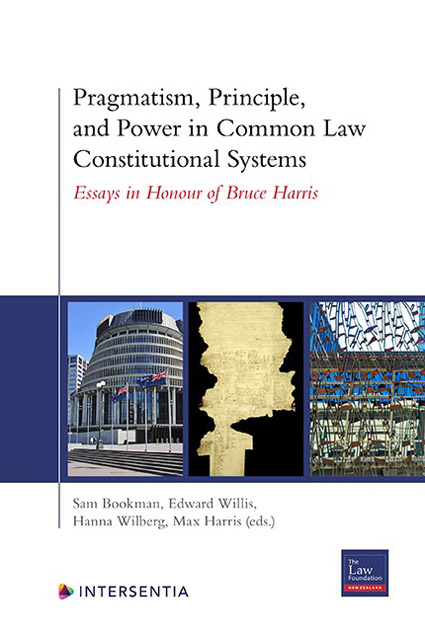 Pragmatism, Principle, and Power in Common Law Constitutional Systems
Pragmatism, Principle, and Power in Common Law Constitutional Systems Book contents
- Frontmatter
- Foreword
- Preface
- Contents
- The Writings of Professor Bruce Harris
- List of Cases
- List of Contributors
- Introduction
- Part I The Nature of Executive Power
- Part II Issues Concerning The Judiciary: The Nature of Judicial (and Executive) Power
- Part III Issues Concerning The Judiciary: Creativity and Pragmatism in Judicial Method
- Part IV Issues Concerning The Judiciary: Judicial Appointment and Accountability
- Part III The Nature of Unwritten Constitutions and Their Future
- Index
BV Harris’s Promotion of a Judicial Commission for New Zealand
Published online by Cambridge University Press: 19 November 2022
- Frontmatter
- Foreword
- Preface
- Contents
- The Writings of Professor Bruce Harris
- List of Cases
- List of Contributors
- Introduction
- Part I The Nature of Executive Power
- Part II Issues Concerning The Judiciary: The Nature of Judicial (and Executive) Power
- Part III Issues Concerning The Judiciary: Creativity and Pragmatism in Judicial Method
- Part IV Issues Concerning The Judiciary: Judicial Appointment and Accountability
- Part III The Nature of Unwritten Constitutions and Their Future
- Index
Summary
THE IMMENSE POWER of JUDGES
In approaching the question whether a judicial commission should be established in New Zealand, Bruce Harris begins by emphasising the immense power judges exercise. Judges decide, inter alia, whether citizens should be imprisoned, whether contracts exist and should be enforced, and whether decisions of Ministers should be rendered valid or invalid. It follows, in Harris's thinking, that society should ensure the best possible processes are in place for judicial appointments, judicial discipline and continuing professional development.
I propose to focus on Harris's proposal that a judicial commission should be established to monitor judicial appointments. Harris's writings on this topic reflect his capacity to approach a practical issue with academic discipline.
Harris's emphasis on the vast power judges exercise is undoubtedly the correct starting point. In a democracy, power is not permitted to go unrestrained. Those who exercise that power must be held accountable. The conflict or tension which Harris then confronts is the need to maintain the independence of the judiciary, on the one hand, while at the same time holding judges accountable, on the other. This tension necessitates a more formal process than that which is now in place. The present system, he argues, is unsatisfactory when tested against constitutional principle and when contrasted wiThthe successful experience of judicial commissions overseas.
THE INDEPENDENCE of THE JUDICIARY
The main constitutional principle that supports the adoption of a judicial commission is ‘the furthering of the actual and perceived independence of the judiciary’. Harris contends that the ‘foundational principle’ is that the judiciary needs to be in both reality and perception independent from the legislature, the executive and all other organisations and individuals within the community. This foundational principle is the basic theme in Harris's advocacy for the creation of a judicial commission.
I consider that Harris is correct to emphasise that the principle embraces the ‘perceived’ and not just the ‘factual’ independence of the judiciary. For the public to have confidence in the judiciary, the perception is probably as important as the reality. A formal process for the appointment of judges can only strengthen the perception the judiciary is independent.
- Type
- Chapter
- Information
- Pragmatism, Principle, and Power in Common Law Constitutional SystemsEssays in Honour of Bruce Harris, pp. 203 - 216Publisher: IntersentiaPrint publication year: 2022


